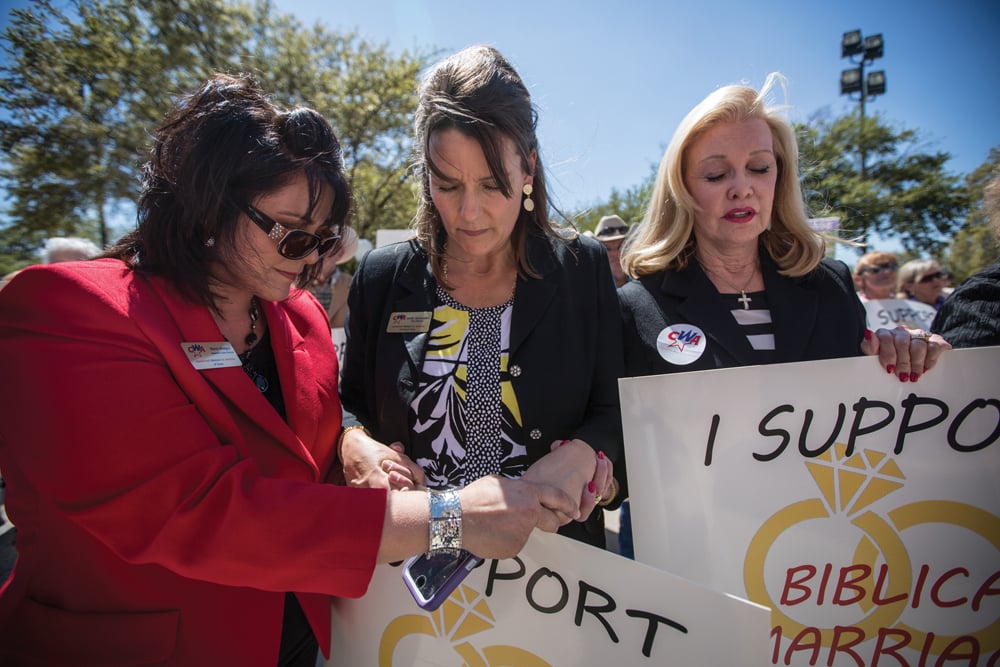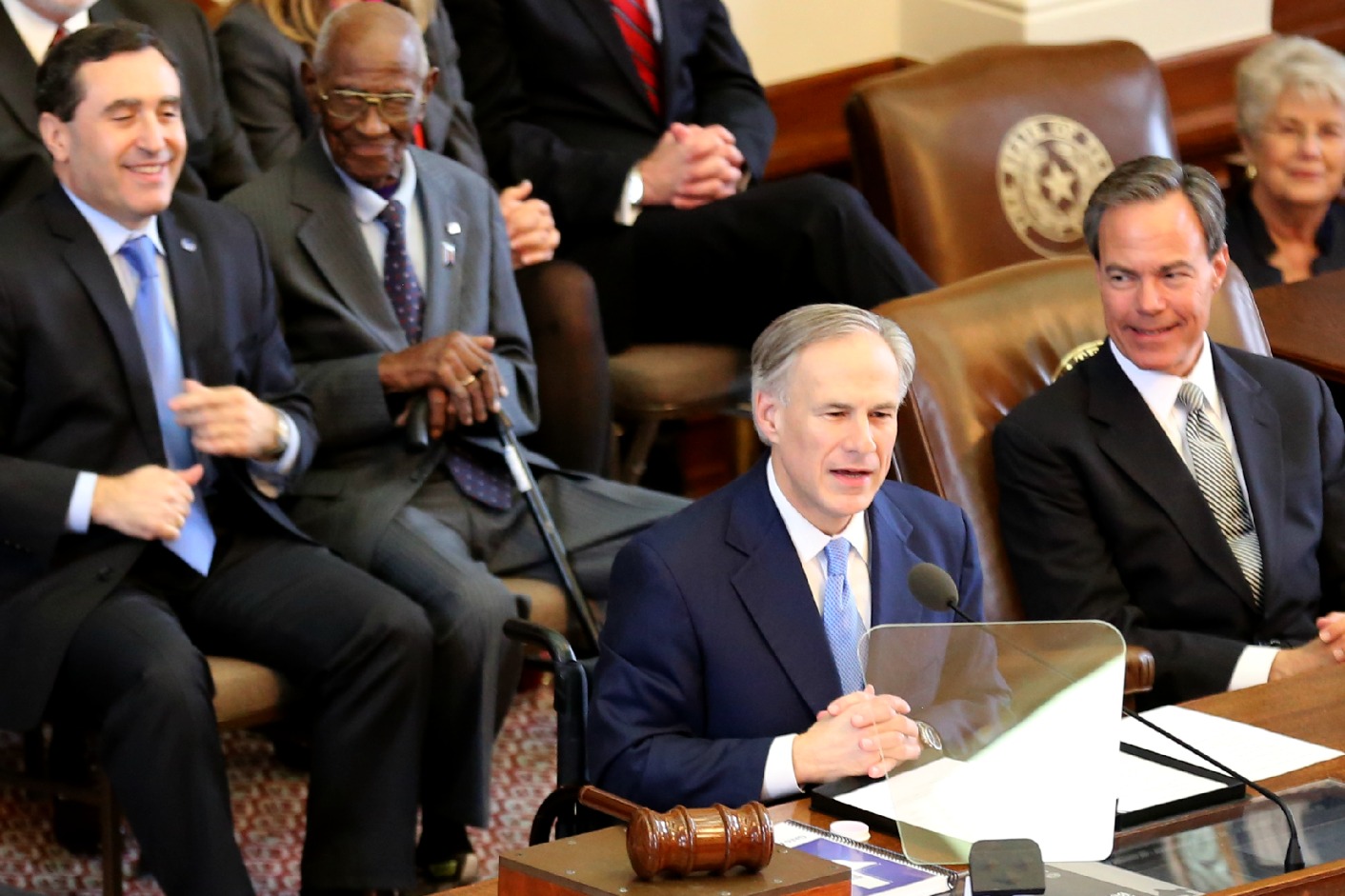
Op-Ed: How Texas Conservatives Keep Gay Couples Locked in Marriage
Above: March for a non-discrimination ordinance in San Antonio
In his last few sessions in the Texas Legislature, former state Rep. Warren Chisum, a conservative Republican from Pampa, filed legislation to chip away at no-fault divorce. Before he left the Legislature in 2012, Chisum sought to strengthen marriage by making it more difficult to divorce. Chisum also happened to be among the most outspoken anti-gay members of the Legislature and the architect of the state’s 2005 ban on same-sex marriage and civil unions.
Much has changed since Chisum began his marriage crusades. Fourteen states now recognize marriage equality and, following this summer’s landmark U.S. Supreme Court ruling in United States v. Windsor, so does the federal government. Windsor has sparked a number of lawsuits around the country, challenging both state bans on same-sex marriage and the recognition of marriages performed in other states. Despite these bans, thousands of legally married same-sex couples now reside in states, like Texas, that prohibit marriage equality. While many states grapple with whether same-sex couples can get married, Texas is deciding whether same-sex couples must stay married.
As it turns out, Texas’ anti-gay policies may create something very close to Chisum’s ideal of lifelong marriage—but, ironically, only for same-sex couples. Texas’ laws against same-sex unions may have the perverse effect of keeping same-sex couples bound in marriage.
Today, the Texas Supreme Court addressed the question head-on: Even though Texas does not recognize same-sex marriage, must it authorize divorce?
The case at issue, J.B. v. H.B., involves two men who married in Massachusetts and lived in Dallas at the time they filed for divorce in 2009. Although the divorce is uncontested between the parties, Texas Attorney General Greg Abbott intervened to stop the court from granting the divorce. Abbott contends that the state’s ban on same-sex marriage strips any Texas court of the ability to hear the divorce. Attorneys for the couple would have Texas treat the right to marry as distinct from the right to divorce. They also argue that prohibiting access to courts for the purpose of divorce violates due process and equal-protection rights.
Abbott’s position is that the only legally valid way for a same-sex couple to end their marriage in Texas is to void it. Unlike a divorce, voiding a marriage nullifies it from its inception—legally, it’s as if the marriage never took place. In Texas, marriages between blood relatives or with a married individual are legally void. Thus, Abbott would have Texas treat same-sex marriage on par with a marriage involving bigamy or incest. The problem with this position is not just that it demeans the relationship (intentionally, no doubt).
Marriage creates rights and obligations with respect to each other’s property and person. Unlike divorce, voiding the marriage does not provide a wholesale remedy for separation, precluding the couple from fully disentangling from each other’s lives and starting anew. For example, while the couple’s marriage may be void in Texas, they could continue to accrue debt and property as a couple in the state in which they married. Perhaps more important than property rights, without divorce individuals may not be able to re-marry. One Texas court explained that to deny divorce is to place the couple “in a prison from which there was no parole.”
Voiding marriages is not unprecedented in Texas. However, as Abbott acknowledges, voiding a marriage does not provide the same “robust protections” as divorce. Abbott would treat divorce as a special right of marriage reserved only for heterosexual couples. And, yet, as much as Texas may wish to close its eyes to same-sex marriage, the marital relationship is still a legal fact. The couple is legally married according to the laws of many states and the federal government, and therefore, subject to numerous legal rights and responsibilities related to marriage.
Though Texas may wish to ignore it, married same-sex couples are entangled in much the same way as other married couples and, thus, the “robust protections” of divorce are a practical necessity in order to adequately dissolve the marriage. Without this, the couples’ lives may remain inextricably bound, creating a multitude of unforeseen problems in the long term—problems that will inevitably require courts and lawyers to resolve.
And this is exactly what the state proposes: Abbott’s solution is to leave it to lawyers and the courts to iron out in piecemeal fashion. The result will be a court-constructed process of dissolving same-sex marriage that will essentially duplicate some, but not all, of the legal rights and protections offered through divorce—a “skim milk” divorce, if you will. At the same time, it will take countless billable hours and legal fees to work out the inevitable conflicts that will arise due to failure to finalize the marriage.
Texas’ stubborn resistance to the inevitable push toward marriage equality will be responsible for a mountain of unnecessary legal complications while depriving the couple of the right to resolution and finality that comes with divorce. Of course, Texas same-sex couples could decide to simply endure an unworkable relationship. Warren Chisum would be proud.
Elizabeth Brenner is an attorney in Austin, Texas. She graduated from University of Texas School of Law in 2003.


